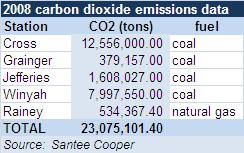SEPT. 18, 2009 -- Santee Cooper is facing a fork in the river of survival thanks to big economic changes and looming federal regulation that could alter its future structure and mission.
 Will it lose more power-generation market share to out-of-state suppliers? Will it explode prices to cover the costs of writing down losses on its antiquated and polluting coal-fired plants as it converts to nuclear? Will the state get out of the power-generation business altogether and have Santee Cooper simply become a smaller, distribution company?
Will it lose more power-generation market share to out-of-state suppliers? Will it explode prices to cover the costs of writing down losses on its antiquated and polluting coal-fired plants as it converts to nuclear? Will the state get out of the power-generation business altogether and have Santee Cooper simply become a smaller, distribution company?
Whatever is coming, the river seems swollen and angry.
Over the past two decades, the state-owned utility that provides power to roughly 40 percent of the state has seen its industrial power base erode as textile factories and then other manufacturers found new homes in cheaper countries overseas and to the south.
Industrial and residential consumers also have cut back power usage during the recession, further driving down power demands -- a far cry from the utility’s projected and feared “rolling blackouts” it hyped as reason for constructing newer plants.
 Demand for electricity hasdropped during the current recession to spur Santee Cooper this summer to back off plans to construct an environmentally-contentious coal-fired plant in the Florence area. Plans to build the proposed plant also were hurt when five of the state’s 20 electric cooperatives that the utility supplies with electricity recently said they would jump ship to purchase future power from a North Carolina company. This move could result in a roughly one-sixth drop in future baseload power generation estimates for Santee Cooper over the next 10 years, according to company sources.
Demand for electricity hasdropped during the current recession to spur Santee Cooper this summer to back off plans to construct an environmentally-contentious coal-fired plant in the Florence area. Plans to build the proposed plant also were hurt when five of the state’s 20 electric cooperatives that the utility supplies with electricity recently said they would jump ship to purchase future power from a North Carolina company. This move could result in a roughly one-sixth drop in future baseload power generation estimates for Santee Cooper over the next 10 years, according to company sources.
The immediate future may not be particularly promising either as Santee Cooper anticipates the impact of the federal Waxman-Markey cap-and-trade carbon tax bill. The regulatory measure, which has passed the U.S. House and is expected to be tackled as soon as next month in the Senate, seeks a major reduction in carbon emissions. South Carolina is ranked 25th nationally in such emissions.
Any carbon tax would likely have a significant impact on Santee Cooper, which emitted more than 23 million tons of carbon dioxide last year. The overwhelming majority of the emissions came from the 9.1 million tons of coal it burned, according to data provided by Santee Cooper. (See chart).
 But getting out of the business of burning coal for power will be costly. Nuclear power plants are comparatively cheaper to run, fuel and maintain, but can carry an upfront construction cost of nearly six times that of a coal plant, according to several industry sources.
But getting out of the business of burning coal for power will be costly. Nuclear power plants are comparatively cheaper to run, fuel and maintain, but can carry an upfront construction cost of nearly six times that of a coal plant, according to several industry sources.
Santee Cooper has partnered with other private state utilities for future nuclear plants, but will the state-owned utility, several degrees smaller than regional heavyweights like Duke Power, be able to attract the necessary bond load to build its own?
“I don’t see a bleak picture,” said Santee Cooper board member John “Cal” Land IV. He said the company did have a host of challenges – very serious ones -- but that it would handle the changes and never get out of the power generation business.
Land said once the nation’s and the state’s economies rebound, so would the energy market. “Our industry baseload demand has dropped 20 percent in the last two years alone in South Carolina,” he said.
Land said the changing economic and regulatory environment meant Santee Cooper would have to evolve, becoming more involved in other fuel and generation sources.
Just this week, Santee Cooper kicked off a residential power conservation effort, Reduce the Use South Carolina, with hopes of saving 209 million kilowatt hours annually within 20 years. (If we’ve done our math right, that means the conservation effort could save the equivalent of powering about 14,000 homes a year. )
|
“Our industry baseload demand has dropped 20 percent in the last two years alone in South Carolina."
-- Santee Cooper director John "Cal" Land IV of Manning
|
Land also said the cost of potentially closing coal plants in the future wouldn’t be disastrous because several of the utility’s coal facilities were close to the end of their design life.
But Land may be wrong on the rebounding economy as the state’s energy panacea if one economist is to be believed.
Donald Schunk, one of the state’s leading economists, said the end of the recession would make things better across the board in the state, but not better enough to change the direction of the state’s energy future.
“The loss of the state’s industrial base is a long-term issue that will not be solved by the recession going away,” said Schunk. “This is a trend that is not going away. It is a trend that is accelerating. And that will continue to result in the loss of more and more industrial customers for utilities.”
Fewer companies and more conservation in South Carolina homes don’t equal a rosy picture for Santee Cooper, according to Schunk.
He warned against Santee Cooper morphing into a power distribution-only company, which would leave the environmentally compromised job of generating electricity to companies in other states, and just redirecting their excess capacity to homes and businesses across the state.
One reason, according to Schunk, would be that it would give the state very little flexibility in offering advantageous power supply deals to prospective energy-dependent industry and companies, like Nucor, which runs a “mini” steel mill near Huger.
The second, said Schunk, was that at some time, the excess capacity available in other states would be called home to service the residents they were meant to serve. And that could leave parts of the Palmetto State high and dry, energy wise.
Crystal ball: While some conservationists were excited about the defeat of the Florence coal plant and the deal for Upstate electrical coops to buy power from North Carolina suppliers, the latter isn’t a done deal and must still get approval from that state’s utility review commission. Regardless, the biggest obstacle roiling the waters is the Waxman-Markey bill. If a harsher than expected version emerges from the Senate, then Santee Cooper could have even rougher water ahead.